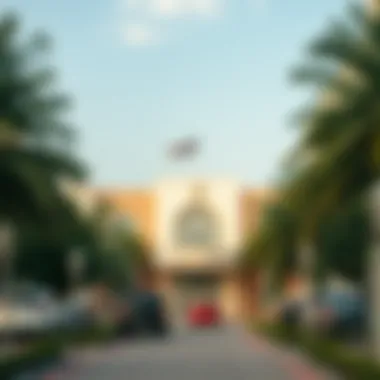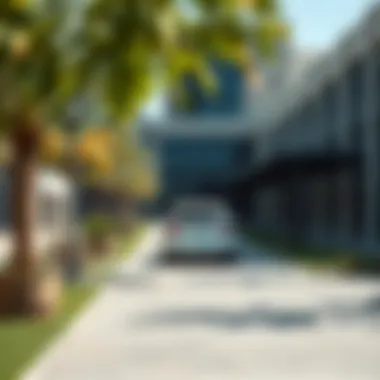Comprehensive Guide to Schools in International City Dubai


Intro
In the hustle and bustle of Dubai, International City stands out for its unique blend of cultures and opportunities, especially regarding education. This neighborhood, designed with an international flair, is home to a variety of schools catering to its diverse community. Parents seeking quality education for their children often find themselves exploring the options available within this exceptional locale.
International City boasts an array of educational institutions that range from international baccalaureate schools to those following the British or American curricula. Each institution presents distinct strengths, tailored to the international populace, which predominantly consists of expatriates and families from various backgrounds. With a commitment to providing a well-rounded education, schools in this area often enrich their students with cultural awareness and global perspectives.
As education plays a pivotal role in community building and personal development, it is essential for parents and guardians to grasp the choices available. Understanding the schools’ admission processes, specialized programs, and available facilities can significantly influence decisions made for a child's educational journey. This guide is crafted to help sift through the myriad of options, offering insights that can lead to well-informed decisions for families invested in their child’s future.
Moreover, it’s crucial to recognize the broader impact these schools have on the local community in International City and the wider educational landscape in Dubai. Schools not only serve to educate but also foster social connections and networks among families. The thriving schools here contribute to the rich tapestry of International City, making it a sought-after area for families looking to settle in Dubai.
For parents interested in this educational ecosystem, examining the various schools’ curricula, facilities, and admission requirements is a necessary step. Exploring such details can help uncover the right fit that aligns with their children’s needs and aspirations. The following sections will delve deeper into specific schools, their offerings, and unique traits that make them valuable contributors to this vibrant neighborhood.
Overview of International City Education Landscape
Education in International City, Dubai, plays a pivotal role in shaping not only the academic future of its residents but also the cultural fabric of this diverse community. As a hub for expatriates and local families alike, the educational institutions here cater to myriad nationalities, offering curricula that span across various educational methodologies and philosophies. This melting pot of culture and tradition deserves a closer examination, as it reflects the demands and expectations of a globalized society.
Preface to International City
International City is recognized for its unique architectural designs inspired by various countries. This design translates into a community that values multiculturalism and global perspectives. One can readily observe students and families hailing from various corners of the world, sharing and blending cultures within the school environment. Educational bodies operating in this district are shaped inherently by the cosmopolitan nature of its residents. The schools often offer blended curricula, integrating the local educational standards with international educational practices, allowing students to thrive in a cooperative and inclusive atmosphere.
On a broader scale, the education sector in this area serves not just to cultivate knowledge but to promote understanding among diverse populations, fostering an environment of tolerance and respect. Such circumstances can have a profound impact on personal growth, preparing students for future challenges in a multilayered world.
Significance of Education in the Community
Education in International City is not merely about academic achievement; it forms the backbone of community engagement. The local schools are community hubs where families forge connections, share experiences, and participate in collective activities. As children attend school, their families get involved in parent-teacher associations, cultural festivals, and volunteer initiatives, creating strong communal ties.
"The school isn’t just a place for learning; it’s where friendships blossom and community bonds are woven."
Moreover, schools in this area often reflect the community's needs by addressing various educational gaps and enhancing socio-economic development. Through educational initiatives, schools equip students with not only academic knowledge but also life skills necessary for navigating an increasingly complex world. This focus on comprehensive development resonates well, ensuring that the region's youth are prepared for a global market.
As a result, the significance of education in International City extends beyond individual growth, ultimately influencing the local economy and social harmony. This educational landscape invites further exploration into the types of schools available and the unique features that these institutions bring to the community.
Types of Schools Available
In the varied landscape of education in International City, understanding the types of schools available is essential for parents and guardians aiming to foster the best educational environment for their children. This area boasts a diverse mix of educational institutions, tailored to cater to the needs of its multicultural population. Each school type offers distinct advantages, shaping the educational experience and preparing students for future challenges.
Public Schools in International City
Public schools in International City provide free education to residents and are governed by the UAE's educational authority. These schools follow a uniform curriculum set by the government, aiming to meet national standards. While public schools often have a larger student body and less individualized attention compared to private schools, they offer valuable benefits. For instance, they promote local culture and community values, which can aid in cultural integration for expats and locals alike.
Parents may find that enrollment procedures, though straightforward, require specific documents related to residency and child age. Also, public schools often emphasize Arabic language skills, giving children a chance to immerse themselves fully in the local culture and language, an experience that can be beneficial in both personal and professional contexts.
Private International Schools
Private international schools in International City have gained popularity due to their global curriculums and diverse environments. These institutions tend to cater to expatriate families, providing educational experiences that reflect various cultural backgrounds. Many of these schools offer the ability to teach in multiple languages and emphasize international mindedness, preparing students not just academically, but also as global citizens.
Benefits of private international schools include smaller class sizes and innovative teaching methods that focus on student engagement and critical thinking. The fees for these schools can be somewhat high, and parents are advised to thoroughly examine the school's accreditation to ensure they meet desirable educational standards. Families can also expect more flexibility in terms of extracurricular activities and personalized learning plans.
British and American Curriculum Schools
British and American curriculum schools are prominent choices among expatriates in International City. These schools are designed to mirror the educational standards of their respective countries, offering programs like the GCSE or A-levels in British systems and the SAT and ACT for American systems.


Enrollment in these schools typically provides students with a well-rounded education, often characterized by a strong emphasis on critical thinking, creativity, and independent thought. Moreover, these schools facilitate smooth transitions for students relocating to different parts of the world, as their qualifications are recognized internationally.
Some parents may also favor these curriculums because of their established reputation for academic excellence and support for university preparedness. The array of extracurricular opportunities further enriches the educational experience, often helping students discover new interests and skills.
IB Curriculum Institutions
International Baccalaureate (IB) schools in International City offer a globally recognized education framework that encourages critical thinking, intercultural understanding, and respect. IB programs are intentional in their holistic approach, combining rigorous academic standards with an emphasis on personal growth and community service.
IB schools believe in nurturing not just students' intellect, but also their emotional and ethical development. This approach often appeals to parents who value an education that prepares their children not only for university but also for making positive contributions to the world. The pathway through the IB curriculum might be demanding, but it equips students with the skills needed to adapt and excel in a rapidly changing, increasingly interconnected globe.
"Education is not preparation for life; education is life itself." - John Dewey
As families consider the educational options in International City, reflecting on the unique features of each type of school is crucial. Each institution plays a significant role in shaping children’s futures and preparing them for the broader world, making the choice one of the most critical decisions a parent can make.
Key Features of Schools in International City
Schools in the International City area of Dubai are not just places for education; they are vibrant hubs where learning meets innovation and community engagement. The sheer variety of key features present in these institutions caters to the diverse needs of the families residing in this multicultural neighborhood. Understanding these aspects is essential for any parent or guardian considering the options available for their children.
Student-Centric Learning Approaches
One of the defining traits of schools in this area is their commitment to student-centric learning approaches. Schools often implement innovative teaching methodologies to ensure that lessons are not just absorbed but actively experienced. This means blending traditional teaching with modern techniques like project-based learning, where students engage in real-world tasks that enhance their understanding and retention of information.
Classrooms encourage discussion and collaboration, allowing students to learn from each other and develop interpersonal skills. For instance, some schools utilize inquiry-based learning, where students are encouraged to ask questions and explore topics that pique their interest. This tailor-made educational experience fosters not only academic growth but also personal development, providing students with a well-rounded foundation.
Extracurricular Activities and Facilities
Extracurricular activities play a major role in enriching a child's education beyond the classroom. Schools in International City often boast an impressive array of options, including sports, arts, and cultural programs. These activities are essential for promoting teamwork, creativity, and healthy competition.
Facilities at these institutions are typically well-equipped. Many schools feature expansive sports fields, well-maintained art studios, and dedicated spaces for music. For example, a school might provide facilities like swimming pools or auditoriums, enabling students to explore their talents and participate in various events. Such investment in extracurricular offerings not only enhances student engagement but also promotes a sense of belonging within the school community.
Teacher Qualifications and Experience
The caliber of educators in the schools at International City is a significant factor contributing to the overall quality of education. Schools prioritize recruiting teachers with substantial qualifications and experience. Many educators hold advanced degrees in their areas of expertise and possess international teaching credentials.
Beyond qualifications, local and international experience is highly valued. Teachers often bring diverse methodologies and cultural perspectives to the classroom, enriching the educational experience. This cultural amalgamation fosters an environment where students are exposed to various viewpoints, preparing them for life in an interconnected world.
Admission Processes and Requirements
Understanding the admission processes and requirements for schools in International City, Dubai, is crucial for parents and guardians seeking the best educational opportunities for their children. The journey of securing a spot at a school is not just about filling out forms; it involves a comprehensive understanding of timelines, necessary documentation, and evaluation criteria. Each school has its unique processes, influenced by its curriculum, mission, and student demographics. Navigating these aspects can empower families to make informed choices, ensuring that children are enrolled in an environment that cuts the mustard for their educational needs.
Application Timeline and Deadlines
The application timeline is often a maze of deadlines that can catch even the most organized parents off guard. Typically, most schools in International City begin accepting applications well before the academic year starts. Many institutions suggest beginning the application process six months prior to the intended start date. This allows families sufficient time to gather required documents and navigate any administrative hurdles. Some schools even offer early bird applications, which may come with benefits like discounted fees.
Here’s a rough timeline that parents might find useful:
- Initial Research: 6-12 months before the school year starts.
- School Visits and Open Days: 5-6 months prior.
- Application Submissions: 4 months before the school term begins.
- Interviews and Assessments: 3 months in advance.
- Notification of Acceptance: 2 months out.
This timeline will vary by school, so it is prudent for parents to check the specific dates aligned with each institution's academic calendar.
Documentation Required for Admission


When it comes to admission documentation, getting your ducks in a row is essential. Each school usually has its own set of requirements, which may include:
- Birth Certificate: Proof of age is usually a no-brainer.
- Previous School Records: Important for assessing academic history and placement.
- Health Records: Immunization records or a health check-up report may be necessary.
- Passport and Emirates ID: Essential for identification and residency validation.
- Application Form: Completed forms which provide essential information about your child and family.
The compilation of these documents must be approached meticulously. It can often be a hassle, but ensuring all paperwork is in order can lead to a smoother admission process.
Evaluation and Selection Criteria
Schools in International City typically aim to build a diverse yet well-rounded student body. Hence, the evaluation and selection criteria can be a bit of a mixed bag. Factors often considered during the admission process include:
- Academic Performance: Previous grades often play a pivotal role.
- Interviews: Some schools conduct interviews with both students and parents. These meet-and-greets help the school gauge a child's personality and how well they might integrate into the school environment.
- Extracurricular Interests: Schools may also look for talents or interests outside the classroom, especially for institutions emphasizing holistic education.
- Recommendation Letters: Personal recommendations can bolster an application.
Understanding these criteria will give parents insight into what schools are looking for, enabling them to highlight specific strengths of their child during the application process.
"Preparation inches you closer to success; being caught off guard can send you into a tailspin."
It's wise for families to properly plan and engage openly with school administrations to clarify any uncertainties regarding the admission process.
Comparative Analysis of Top Schools
Comparative analysis of schools serves a crucial role as it allows parents and guardians to evaluate the educational landscape within International City. By comparing different institutions, they can discover not merely which school is the best, but which one aligns with their child’s educational needs and family values. This analysis encompasses various factors such as academic performance, parent and student feedback, and the overall cost of education. It ultimately helps families make informed decisions on where to invest in their child's future education.
Academic Performance Metrics
When it comes to evaluating schools, academic performance metrics are often at the forefront of any comparison. These metrics typically include standardized test scores, graduation rates, and university admission statistics. In International City, several schools proudly highlight their academic achievements, while others may be striving to enhance their performance. For example, schools boasting top-tier IB programs usually reflect higher performance metrics, primarily due to their rigorous curriculum and emphasis on critical thinking. Utilizing platforms like Wikipedia may provide insights into the different curricular approaches and their outcomes.
- Key performance indicators to consider:
- Standardized test scores
- Graduation rates
- College acceptance rates
- Availability of advanced placement courses
These indicators can serve as a benchmark for what families should expect from the educational institutions in their search for the right fit. Comparing these metrics also allows families to discern patterns in school performance over time, helping them identify institutions that are consistently raising the bar.
Parent and Student Reviews
One of the most helpful ways to gauge the atmosphere in a school is through parent and student reviews. These insights often present a more nuanced view that statistics alone can't provide. Schools in International City are no exception to this trend. Often, local social media platforms like Facebook or community forums such as Reddit can provide parents with unfiltered opinions on their experiences. Evaluating comments on factors such as:
- Teacher-Student Interaction
- Support for Special Needs
- Extracurricular Offers
- Safety and Environment
can paint a vivid picture of what life is like in a particular school. Parents want to see happy and engaged students as well as faculty that’s dedicated to their roles. Reviews can sometimes reveal aspects about school culture that statistics won’t tell you, making it imperative to include them in the comparative analysis.
Cost and Affordability of Schools
Understanding the cost of education is a key element for many families looking to enroll their children in schools within International City. Tuition rates can fluctuate widely based on curriculum type, school reputation, and facilities offered. For instance, international schools catering to expatriates may charge premium fees compared to local public schools.
Affordability thus becomes a major factor for families considering enrollment. They need to weigh the comprehensiveness of education against what their budget allows.
- Factors influencing costs:
- Type of curriculum
- Facilities (libraries, sports centers, etc.)
- Student-to-teacher ratio
- Additional fees (like extracurricular and exam fees)
In summary, while academic performance is vital, delving into parent and student reviews, coupled with cost consideration, provides a well-rounded perspective on the best schooling options available in International City. Each factor, when taken together, contributes to a clearer picture, helping families make sound educational choices.
Impact of Schools on Community Development


Education does not exist in a vacuum; it is intertwined with the social fabric of a community. In the context of International City, the significance of schools transcends mere academics. They act as catalysts for cultural integration and social cohesion, directly impacting the neighborhood's development.
Cultural Integration through Education
In a melting pot like International City, fostering cultural integration through education is key. Schools here not only serve as places for learning but also as social hubs where diverse cultural backgrounds converge. They often organize multicultural events, showcasing traditions and fostering friendships among students and families from various countries. This hands-on approach to learning about different cultures helps to break down stereotypes and build mutual respect.
Through collaborative projects and art fairs, students learn to appreciate each other's heritage, creating a community that thrives on diversity. Furthermore, when schools provide language support for non-native speakers, they empower families to engage more fully in the educational process and in the community at large.
Contribution to Local Employment
The schools within International City also play a crucial role in local employment. Not just in terms of hiring teachers, administrative staff, and counselors, but also in supporting local businesses. Schools frequently source materials, supplies, and services from the surrounding community, creating a web of economic support.
Having schools nearby boosts property values too, which can attract homebuyers and renters. When families look to settle in an area, the presence of quality schools often tops their list of priorities. Thus, it leads to a more economically vibrant neighborhood, encouraging more job opportunities in various sectors such as education, retail, and services.
Partnerships with Local Organizations
Engagement with local organizations is another vital element influencing community development. Partnerships between schools and local businesses or non-profits pave the way for enriching educational experiences. Schools often collaborate with nearby institutions to provide internships or mentorship programs. This connection not only inspires students but also strengthens community ties.
Additionally, these partnerships can address local challenges, such as offering after-school programs targeting specific needs like literacy or vocational training. Through these collaborative efforts, schools transform themselves into centers of support, enhancing not just the educational landscape but the overall welfare of the community.
As we consider the impact of schools on community development within International City, it becomes evident that these institutions do more than teach; they unite, empower, and invigorate the entire neighborhood, creating a more dynamic and inclusive environment for everyone involved.
"Schools embody the heart of a community, shaping its future while grounding it in shared values and diverse perspectives."
By investing in education, International City is not only fostering better educational outcomes but also cultivating a thriving community that benefits all its residents.
Future Trends in Education in International City
Education in International City is never stagnant; it’s more like a river – always flowing and adapting. As we look ahead, several trends are reshaping the educational landscape here. Understanding these trends is essential for parents, investors, and even educators to stay ahead of the curve.
Adoption of Technology in Learning
In a world increasingly driven by technology, the schools in International City are not lagging behind. Many institutions have embraced the digital age, weaving technology into the fabric of their curriculum. This adoption can be seen in several ways:
- Blended Learning Models: Schools are integrating online resources with traditional teaching. This means students get to learn both in the classroom and virtually, offering them flexibility.
- Interactive Tools: Smartboards, tablets, and educational apps have entered the classrooms, making learning more engaging for students. This technology helps in tailoring lessons to fit individual learning paces.
- Virtual Classrooms: Some institutions even host virtual classes that allow students to attend from home when needed, catering to families with varying schedules and preferences.
With technology, education is becoming more personalized, which can significantly benefit students who may struggle in a traditional learning environment.
Sustainability in Educational Practices
Sustainability isn’t just a buzzword; in International City, schools are taking it seriously. Not only is this beneficial for the environment, but it also prepares students to be responsible global citizens. Key elements include:
- Green Initiatives: Many schools have started implementing eco-friendly practices, such as school gardens or recycling programs, encouraging students to participate actively in preserving the environment.
- Curriculum Changes: Subjects related to sustainability, environmental science, and conservation are now part of the curriculum, allowing students to understand the impact of their actions.
- Community Engagement: Schools often partner with local organizations to promote sustainable practices outside of the classroom. This linkage helps students see the real-world applications of what they are learning.
Sustainability in education not only addresses environmental concerns but also equips the younger generation with the knowledge they need to tackle global challenges.
Global Best Practices in Education
International City’s schools are not just looking inward; they are also taking cues from educational practices around the world. Here are some best practices being adopted:
- International Baccalaureate (IB) Models: These programs focus on critical thinking along with a liberal arts approach, preparing students for life beyond the classroom.
- Inclusive Education Practices: Schools are making strides to adopt more inclusive practices so that all students, regardless of ability, can thrive in their educational journey.
- Parent and Community Involvement: Many successful programs encourage active parental engagement and community input, essential for building a well-rounded educational experience.
These aspects are crucial as they make the local educational environment richer and more diverse, which is essential for developing well-rounded students.
"Education is the most powerful weapon which you can use to change the world." - Nelson Mandela
As International City continues to grow and evolve, keeping a finger on the pulse of these trends can help all stakeholders—from parents to local businesses—maximize the potential benefits of the schools in this diverse community.







